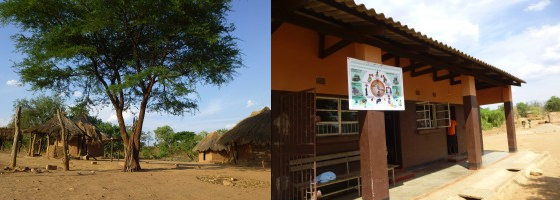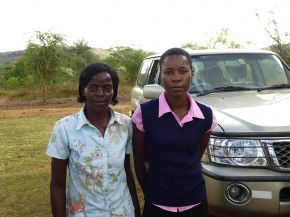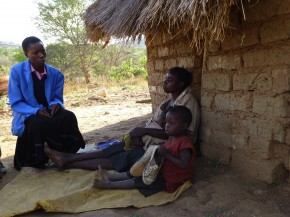After visiting Siavonga District (mentioned in my last post), we travelled to Monze District and then deep in to the bush to visit a remote health post at Kayola.

The first leg of the journey was down 20 kilometres of rough, dusty, rock-strewn dirt track to reach Nampeyo rural health centre (a health promotion poster linking hygiene and health was posted outside the centre and is pictured above).

At Nampeyo, we picked up the nurse/midwife and Environmental Health Officer who were previously the only service providers for this large but sparsely populated area. We travelled with them a further 17 kilometres across even rougher terrain to the health post at Kayola (unfinished at present), where the two newly recruited Community Health Assistants, Susan and Hilda (pictured) are based.
Both Susan and Hilda come from the area and they were selected by their communities to be trained as Community Health Assistants. I was incredibly impressed by their energy, interest and commitment to serve their communities. We accompanied them on visits to households. Below is a picture of Susan visiting a mother with her two children.

The child, by his mother’s side in the picture, is one of twins, both of whom are very small for their 5 years of age. Stunting (a failure to grow properly as a result of inadequate diet) is a significant problem in Zambia, and in many developing countries, and is the result of chronic under nutrition. The baby in the mother's arms was a year old and being breast fed as well as receiving solids, but had already had an episode of acute malnutrition. Advice on good nutritional practice, including weaning practice and when to move from breast food alone to solids is very valuable advice that Community Health Assistants can give. However, for poor households, which are often single parent households where a husband may have died or left the family, there is limited money available to buy even basic food supplies and money becomes as important as advice on good nutrition. One of the services that Susan can provide is to refer community members to cash transfer programmes, which provide a small but important cash sum that can help make the difference between household malnutrition and the ability to cope during times of food shortage. See the Department for International Development's (DFID) evidence paper on the potential benefits of cash transfer programmes.
UK aid support for the Community Health Assistant programme in Zambia includes an evaluation, which will help to make sure that the impact of the programme is measured. Gathering the evidence needed to show that this type of initiative can be a cost effective way of increasing access to basic services and improving health will be important, particularly given national plans to scale up the training of Community Health Assistants to a total of 3,100. This is a potentially important part of Zambia’s response to its health workforce shortages.
I have discussed the issue of health workforce shortages in previous blogs (here and here). This is an issue that has been championed by the Global Health Workforce Alliance, which receives British aid, as well as being discussed by the All Party Parliamentary Group on Global Health – All the Talents report. This visit to Zambia gave me the opportunity to see first-hand how Zambia is working with its partners in order to respond to the health workforce crisis.
One of the key aspects of the programme I was looking at was the evidence base for the effectiveness of Community Health Workers. There have been a couple of systematic reviews of the impact of Community Health Workers and WHO have produced a policy brief. A key message that emerges is that, as with any health worker training programme designed to effectively deliver a basic package of evidence based services, the challenge will be to ensure that care and support is of good quality, is adequately supervised and those trained have access to good supplies of equipment and medicines they need to do their jobs effectively.
I was impressed with the efforts being made in Zambia to make sure that those trained are able to put in to practice what they have learnt.

2 comments
Comment by Mohga posted on
Community health workers in Zambia and other countries deliver effective diagnosis and treatment for malaria and sometimes pneumonia.
DFID should expand its support to such programmes which can provide comprehensive free care at local level. At the same time DFID should help African govts to build their health system from primary health care level where people can get decent treatment for severe cases.
Comment by mutinta musonda posted on
Thank you for appreciating the efforts that Zambia, through the Ministry of Health is making in ensuring that the vision of providing health services to the rural and remote population is realised.